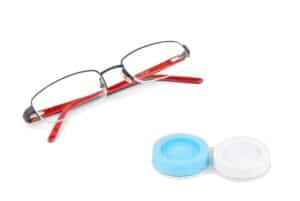
1. Putting You Contact Lenses In Your Mouth: Believe it or not, licking your contact lenses does not “clean them off,” it actually does the opposite. Our mouths are a haven for bacteria that have no business being near your eye!
2. Overwearing Your Contact Lenses: Make sure to not overwear your contact lenses. It is a great idea to have a schedule for when you need to remove your contact lenses so that your eyes can rest. If your eyes don’t receive enough oxygen your corneas can begin to swell, which can lead to more serious conditions such as corneal abrasion and potentially dangerous infections.
3. Sleeping With Your Contact Lenses: This is another form of overwearing your contact lenses. You might notice that if you decide to take a quick nap with your contacts in, that you wake up to find your eyes are red and irritated and potentially even a bit swelled. This is because you are starving your eyes of oxygen and sealing harmful bacteria that could be on your lens in with your eyes when you close your eye lids. You could actually end up going blind if you continue to do this.
4. Getting Makeup On Your Contacts: Don’t under any circumstance allow for makeup to remain on your contact lens. If you accidentally get some eye liner on your contact, then you need to take the lens out and give it a proper cleaning or you risk irritating your eyes.
5. Continuing To Wear Your Contact Lens Even Though Your Eyes Are Irritated: If your eyes are red and irritated after putting your contact lenses in, that means something is wrong with the lenses and they need to be cleaned properly before being put back in. If the redness in your eyes wont clear up then you might already have an eye infection, if this is the case don’t put your contacts in and make an appointment to see your eye doctor.

